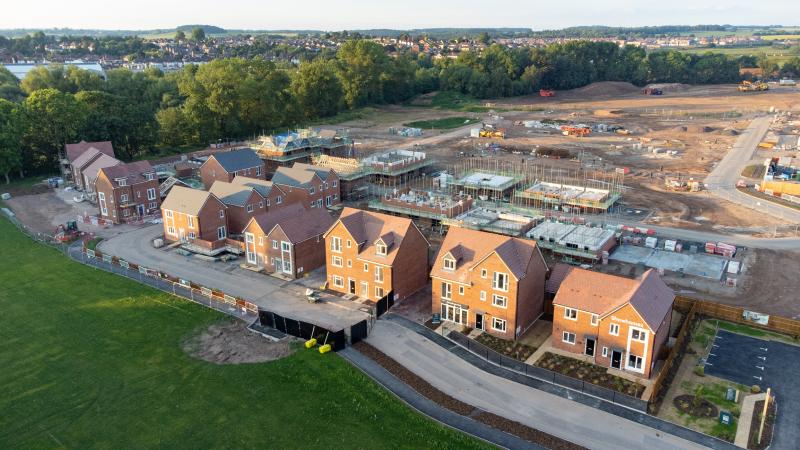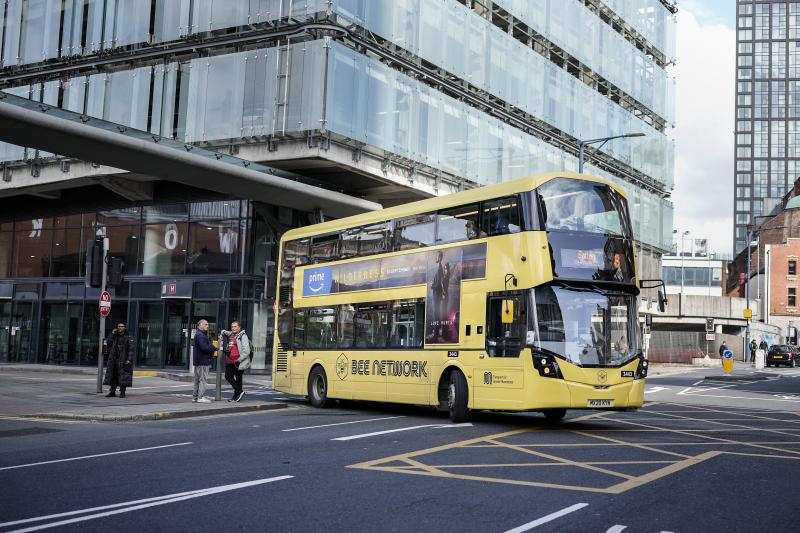Sandra Bell30 Sep 2025
An important new Bill that falls short on climate and nature
In July 2025 the Government published its English Devolution and Community Empowerment Bill (The Devolution Bill). This is an important Bill because it will put into law the government’s ambition that every part of England will be covered by a Strategic Authority (SA) with in most cases an elected Mayor. Mayors and their authorities will be powerful, having new duties and responsibilities relating to economic growth, housing, health and transport. But as ‘environment and net zero’ is simply listed as an ‘area of competence’ with no specific powers or duties, taking action on climate and nature will be optional for SAs unless already required by other legislation.
Some Strategic Authorities will be new. Others will be bringing existing Mayoral Authorities like Greater Manchester into a new hierarchy. The government has identified 6 new priority devolution areas (which will elect Mayors in May 2026 and May 2027) — at which point 80% of the English population will be under mayoral devolution. However, despite the name of the Bill there’s a risk that these new strategic bodies will seem distant to their communities and rather than empowering them, public participation in some areas like planning could be weakened.
Use the map below to see where existing and future combined authorities are and who's mayor of each. Click on the circles to bring up an area's details and zoom in by scrolling.
Polls and focus groups consistently show that most people are concerned about climate change and nature. They support action where they can see the co-benefits like job opportunities in green industries, better bus services, cleaner air, and warmer homes. But it’s a simple truth that we won’t meet our climate and nature targets without action from the Strategic Authorities and local authorities – they’re vital to cutting emissions in key areas like transport and homes, they can improve access to nature-rich green space and they’re best placed to listen to their communities.
The Devolution Bill should set out a clear purpose to cut climate emissions, boost nature and help areas adapt to climate change impacts. Instead, as it stands, it’s a huge, missed opportunity to accelerate regional and local delivery of climate action and achieve more resilient places. Some existing Mayors are already taking steps towards a low carbon economy but – as we have reported before progress is mixed. Now this Bill risks stalling or reversing existing progress – and at a time that some regionally and locally elected representatives have a stated anti net zero agenda, it’s too important to leave this to the vagaries of political will. For example, Kent County Council has rescinded its declaration of a climate emergency and Andrea Jenkyns, elected as Mayor of Greater Lincolnshire in May 2025 has said she wants to “ditch net zero and actually focus on economic growth”, ignoring the potential for investment in green jobs. In this context it’s a major oversight for the Bill to require local growth plans with no alignment with decarbonization and provision of green jobs.
Why amending the Bill matters
Amending the Devolution Bill to align with the targets in the Climate Change Act 2008 and Environment Act 2001 would provide consistency and clarity for Strategic Authorities, local authorities, developers and investors. It’s not just Friends of the Earth calling for a climate and nature duty. The Local Government Association (LGA) has said that councils require statutory duties, powers and resources to lead on climate action. Other local government organisations calling for a duty include the District Council Network, London Councils, the Association of Directors of Environment, Economy, Planning and Transport (ADEPT) and UK100 Over 100 businesses have called for a duty, noting that the consistency it would provide would help support investment and provide clarity across the planning system.
What the government should do
It should
Include a statutory duty in the English Devolution and Community Empowerment Bill for all Strategic Authorities and local authorities to contribute to national and international climate targets and budgets and adaptation plans and environmental targets.
- Provide adequate resourcing for all levels of local government to play their part in delivering action on climate and nature targets.
Action needed by Mayoral Authorities
- Existing Mayoral Authorities and new Strategic Authorities must draw up and implement ambitious Climate Action Plans for their areas with their communities.
What are the new Strategic Authorities?
The Devolution Bill will move away from the previous government’s model of individual deals for each devolved area in England to a hierarchy of Strategic Authorities (SAs) where powers and funding will be standard at each level of the hierarchy. There will be three types of SA.
- Foundation – no mayor, could in rare cases be a single council, limited powers.
- Mayoral – greater devolved powers.
- Established Mayoral – broadest devolved powers and funding plus ability to request additional powers. Established Mayoral SAs will receive an Integrated Settlement meaning that they have a greater ability to decide on how to spend their budget.
Existing Mayoral Authorities will fit into the hierarchy, for example the Greater Manchester Mayoral Authority and the West Midlands Combined Authority will be an Established Mayoral SA. Mayoral SAs, such as the Tees Valley and the East Midlands Combined County Authority will be able to move up the hierarchy. Foundation stage SAs such as Devon and Torbay Combined County Authority can also move up but only if they elect a Mayor. Guidance on where all areas with an existing devolution deal fit in this hierarchy and when they could move to Established status can be found here.
The Greater London Authority (GLA) will be made an Established Mayoral SA but new powers and duties will apply on a case by case basis so the GLA will maintain some of its bespoke arrangements. Since its inception the GLA was set up with climate and biodiversity duties. However, as it currently stands the English Devolution Bill will create a two-tier system where one strategic regional authority will have climate and nature duties, and the rest won’t.
What new powers and duties will Strategic Authorities have relating to climate and nature?
In this section, we set out the powers and duties that the new SAs will have and identify opportunities where the Bill could be strengthened to support positive action on climate and nature and help improve the lives and welfare of many people in the devolved areas.
The powers and funding granted to SAs will depend to some extent on the level in the hierarchy but most of the new duties and responsibilities will apply to all Mayoral SAs.
Economic Growth
All Mayoral SAs will have a new duty to produce a Local Growth Plan (except London which already has this). Given that Britain’s green economy grew 10% last year, it would make sense for Local Growth Plans to focus on developing resilient low carbon economies with high quality green jobs and a clear and fair transition for workers currently in high carbon activities. As the Chancellor of the Exchequer said in her speech in January 2025: “There is no trade-off between economic growth and net zero. Quite the opposite. Net zero is the industrial opportunity of the 21st century, and Britain must lead the way.”
However with some existing Mayors having publicly stated an opposition to net zero policies, the lack of any statutory requirement on climate highlights the risk that some of these powerful new public bodies could invest in or facilitate high carbon activities.
As other public bodies will also have to have regard to the SA’s growth plans (where objectives have been agreed with central government) these will be very influential documents.
Health
That almost all SAs will have a new duty to ‘have regard to’ improving health and reducing health inequalities is welcome (excepting London and any single local authorities that become SAs as they already have existing health duties). Health inequalities are defined by Government guidance as inequalities of life expectancy or general state of health resulting from difference in general health determinants like standards of housing, transport services, public safety and employment prospects. There is a strong basis here to introduce measures that tackle environmental health inequalities.
However, as it stands it will still be up to the Mayor and SA as to what they include - whether to take strong action on air pollution and health impacts related to cold or overheating homes, for example.
Planning and Housing
All SAs will be required by the Planning and Infrastructure Bill to produce a Spatial Development Strategy (SDS) setting out the strategic planning policies for the area. This is welcome as currently few spatial plans exist at the regional level - yet planning at this level is crucial for climate and nature as it will inform strategic patterns and scales of new development across large geographical areas. For example, the SDS can help to ensure that new housing is more accessible by public transport, walking and cycling, while taking a strategic approach to clean energy provision. SDSs – once adopted – will then be important documents and form part of the statutory development plan in law, while Local Plans from constituent authorities also need to conform with the relevant SDS, as well as planning decisions. Development Plans do have a requirement via the Planning and Compulsory Purchase Act 2004 and Environment Act 2021 to contribute to the mitigation of, and adaptation to, climate change and take account of any Local Nature Recovery Strategy.
However, planning powers that the Devolution Bill will grant to Mayoral SAs will go beyond writing the SDS, giving all Mayors similar powers to London. All SAs will have new planning powers, including being able to call-in planning applications, meaning that the SA could overturn the decision of a local planning authority to “unlock beneficial development for Mayoral areas”
SAs will also be able to prepare Mayoral Development Orders, allowing them to grant planning permission for a development without a planning application being submitted. Without a relevant climate and nature duty these powers could allow Mayors to fast-track high carbon developments or they could choose to fast track low carbon infrastructure, but in either case without local scrutiny.
There is also the question of whether an SDS would have to pay regard to Local Nature Recovery Strategies (LNRSs).The Environment Act requires combined authorities to undertake these to identify areas to support nature’s recovery and improve public access.. Recent amendments proposed to the Planning and Infrastructure Bill (PIB) in the House of Lords have highlighted this risk. Without a clear nature duty SDS could allocate strategic development sites without consideration of strategic nature areas.
All Mayoral SAs will have the ability to set up a Mayoral Development Corporation (which is currently only available to some Mayors) granting them powers for land assembly, including facilitation of new housing development or large-scale regeneration projects.
Given the importance of both the Devolution Bill and the Planning and Infrastructure Bill in guiding how decisions will be made at a regional and local level a climate and nature duty is needed in both.
Established Strategic Authorities will receive devolved funding to deliver retrofit from 2028 – as set out in the Devolution White Paper, but there was no mention of it in the Devolution Bill. However, such funding is not (yet) being devolved to lower tier SAs so the impact will be limited.
Transport
Better public transport, walking and cycling are vital to meeting climate goals as well as ensuring that people without access to a car can get around. All SAs will have a vital role to play, as the Local Transport Authority for the area including oversight of public transport and the production of a Local Transport Plan. The government already requires Local Transport Plans (LTPs) to take account of reducing carbon emissions and has issued guidance on quantifiable carbon reduction. But the Devolution Bill will also require LTPs to align with the local growth plan for which there is no decarbonisation aim set out in the Bill.
As with planning, transport powers go beyond writing strategies. SAs will have the relevant powers to manage public transport networks and a legal responsibility to make sure passenger transport services are provided where appropriate. They will also have powers to manage travel concessions meaning they can make public transport more affordable for those on lower incomes.
Mayoral SAs will also have a requirement to set up Key Route Networks (KRNs) of important local roads. They will have the power to set Traffic Reduction Targets on KRNs - but no obligation to reduce traffic-and no clear aim to reduce air pollution (despite lower tier authorities having such a duty via the Environment Act 2021). All SAs will have powers to implement congestion charging with their constituent councils.
All SAs will have bus franchising powers which they can use to improve bus services, ensure that fares are affordable and require a faster roll out of electric buses. Although this is not specifically set out in the Devolution Bill it was committed to in the Devolution White Paper and is being granted under the Bus Services Bill.
Mayoral SAs will continue to receive multi-year funding for transport – additional funding for 9 Mayoral Strategic Authorities was confirmed in the 2025 Spending Review with one of the main objectives being “decarbonising transport and enabling healthy living, including promoting modal shift from cars to public transport, walking and cycling.”
Education and skills
Responsibilities for adult education and use of Adult Skills Fund will be transferred to SAs. This is an opportunity to invest in the green skills that are needed in a decarbonised economy although without a climate duty there is no requirement in the Bill to do this.
Nature
The Devolution Bill should set out a clear purpose for SAs to play their part in delivering on the targets for nature recovery in England. The UK is a long way from reaching its 2030 goals for nature including its target for 30% of land to be protected for nature. In England Local Nature Recovery Strategies (LNRS) should be leading the way for local level action to halt the decline in nature and set out action for its recovery. These need to be moving at pace to deliver local solutions with local authorities working with communities and businesses. Mayors and SAs should be taking a leading role in developing and implementing LNRSs, working with their communities, but the Devolution Bill does not include anything on the role of SAs in the development and delivery of LNRS. The Devolution White Paper indicated that the new SAs would be the Responsible Authority and Existing Mayoral Authorities have already taken on this role so it would make sense to clarify this in the Bill.
What does the Bill mean for existing local authority climate action?
It has been a mixed picture over the last seven years when it comes to local authority climate action. We’ve showcased great action at the local level but we also know that progress has been patchy with many councils struggling to fund climate action especially after the covid crisis. The experience of our own local groups as well as evidence from the Climate Emergency UK scorecards shows that action at this level is inconsistent and too slow.
It's important that as it creates new SAs with more powers and sets out a path for local government reorganization in the Devolution Bill, the government also ensures that local authorities are able to fully play their part in delivering action on climate and nature in a way that improves the lives of their communities. The government says that SAs won’t replace councils which will continue to have an important role in representing their communities and delivering key services. Local authorities in areas without SAs as well as constituent councils of the new SAs will still have an important role to play.
ADEPT represents over 100 local authorities and has raised concerns that without a climate and nature duty in the Bill, environment and climate matters will not get traction locally - particularly in those areas where councils will now become constituent members of new Strategic Authorities and, for those still in two-tier areas, going through local government reorganisation.
There has also been concern that climate expertise in district councils could be lost in the LGR process (Local Government Reorganisation).
Many local authorities are facing financial crisis and so it’s vital that sufficient resourcing is available to enable them to play their part in developing and implementing key strategies such as SPSs and LTPs.
Community engagement must be at the heart of devolution
Effective and fair action on climate and nature, whether at local or strategic authority level, should be designed in collaboration with the communities those authorities serve. However, despite the name of the Bill it offers no guarantees of genuine community participation. The new SAs won’t have the same level of democratic scrutiny as London, which has a directly elected Assembly with significant powers of scrutiny. As we set out in our previous analysis community engagement on climate and nature is something that must be improved at the regional mayoral authority level especially when devolution deals are deepened. be improved at the regional mayoral authority level especially when devolution deals are deepened.
The Devolution Bill also includes some examples of top- down powers which seem at odds with its community empowerment aim. For example, it includes new ministerial powers to establish SAs without local consent and to direct councils to submit local government reorganisation proposals where sufficient progress is not being made.
The Better Planning Coalition has raised specific concerns about public participation in strategic planning because the new spatial development strategies don’t include a right to be heard for those making representations in their development, unlike with Local Plans. Additionally, the extension of call in powers (see above) means that decisions could be taken away from local planning committees.
Conclusion
We’ll only solve the climate and nature crises with strong action from regional and local authorities. As it stands, the new English Devolution and Community Empowerment Bill is a missed opportunity to ensure that the new Strategic Authorities and other tiers of local government have the duties and powers to do so. That’s why Friends of the Earth is advocating an amendment to the Bill along with many other organisations.
If you’d like more information on the amendments that we’re advocating, Friends of Earth is among the organisations signed up to a joint briefing setting out the case for a climate and nature duty.





